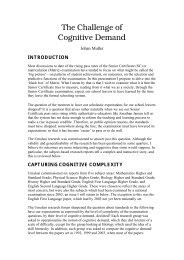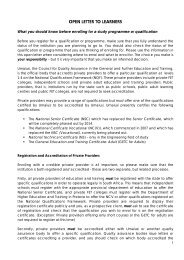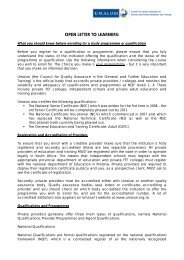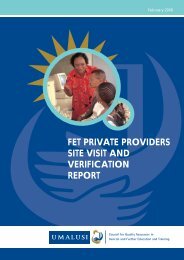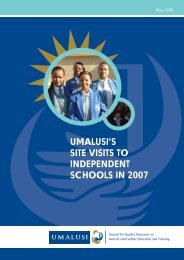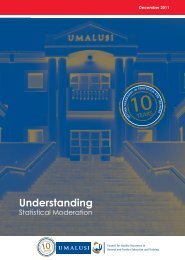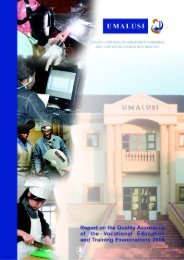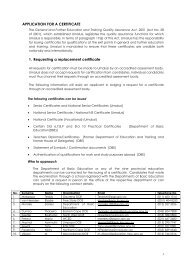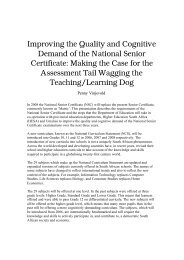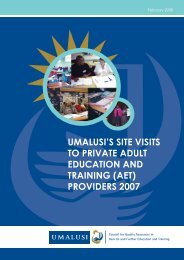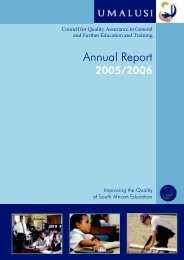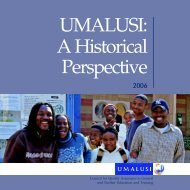Inspecting the Foundations - Umalusi
Inspecting the Foundations - Umalusi
Inspecting the Foundations - Umalusi
Create successful ePaper yourself
Turn your PDF publications into a flip-book with our unique Google optimized e-Paper software.
The problem of English being <strong>the</strong> language of teaching and instruction was once more highlightedin <strong>the</strong> reports from <strong>the</strong> chief markers and moderators: most candidates entering for this examinationare ei<strong>the</strong>r second or third language English speakers. The DoE has indicated its awareness that nodistinction is made between examining English as a fi rst language and as an additional language,a diffi culty which has not been addressed.Even though <strong>the</strong>re has been a steady increase in <strong>the</strong> number of candidates entering <strong>the</strong> GETCexaminations, <strong>the</strong>re is still no real national or provincial intervention strategy or programme tosupport learners who are writing <strong>the</strong> examinations for <strong>the</strong> second or third time. This situation alsoapplies for those learners who may want to improve <strong>the</strong>ir internal assessment mark.Problems with <strong>the</strong> quality of teaching, learning, and assessment need to be addressed as a matterof urgency if <strong>the</strong>re is ever to be a signifi cant increase in <strong>the</strong> numbers of candidates certifi cated.The DoE, having agreed that <strong>the</strong> standard of teaching and learning is poor in ABET classrooms, haspledged to address <strong>the</strong>se concerns.The need for <strong>the</strong> urgent reform of <strong>the</strong> current curriculum to ensure its appropriateness andrelevance is also highlighted in <strong>the</strong> 2008 <strong>Umalusi</strong> report. The right to basic education is a humanright enshrined in <strong>the</strong> constitution, and adult learners deserve quality teaching and learning just asmuch as children do.4.4 CERTIFICATION OF GETC NQF LEVEL 1 QUALIFICATIONS4.4.1 CERTIFICATION OF THE NATIONAL GETC<strong>Umalusi</strong> has been responsible for <strong>the</strong> certifi cation of <strong>the</strong> GETC for Adults since its inception as aqualifi cation in 2001. Table 5 below provides telling information: <strong>the</strong> numbers given in bold refer toLearning Area Certifi cates while <strong>the</strong> fi gures in regular font refer to <strong>the</strong> full GETC: ABET qualifi cation.During eight years of ABET provision, just 11 525 whole qualifi cations have been awarded, withLimpopo and <strong>the</strong> Eastern Cape producing almost 60% of <strong>the</strong> successful candidates between <strong>the</strong>m.The bulk of <strong>the</strong> certifi cation which <strong>Umalusi</strong> has done has been to award subject certifi cates: 94% of<strong>the</strong> certifi cates issued are Learning Area certifi cates. Once again, <strong>the</strong> best performing provinceshave been <strong>the</strong> Eastern Cape and Limpopo who have contributed 48% of <strong>the</strong> certifi cates awarded.The pattern of many fewer whole qualifi cations to Learning Area certifi cates is a trend whichbears analysis, for <strong>the</strong>re may be a variety of factors which contribute to <strong>the</strong> trend. Employers, forexample, may consider Ma<strong>the</strong>matics and Communication in English to be ABET, or at least <strong>the</strong> onlyportion of <strong>the</strong> GETC: ABET <strong>the</strong>y are prepared to fund. Adult learners, equally, may regard <strong>the</strong>seas <strong>the</strong> critical learning areas and be less inclined to study ‘school’ subjects. Conversely, it maybe that PALCs and o<strong>the</strong>r providers fail to offer a full range of learning areas for adults to choosefrom: a result often of having to offer what <strong>the</strong>ir educators are able and willing to teach. Certainly,anecdotal evidence from <strong>the</strong> Western Cape suggests that adult learners often have to take what<strong>the</strong>y can get in ABET programmes, and this is likely to be true at under-resourced PALCs throughout<strong>the</strong> country.Although <strong>the</strong> number of certifi cates awarded would appear to be low in terms of <strong>the</strong> projectedneed for ABET, <strong>the</strong> number is not necessarily a telling indication of <strong>the</strong> value of <strong>the</strong> learning that hastaken place. Many more people may have attended classes and benefi tted from <strong>the</strong> learning,but may have been too anxious to write <strong>the</strong> exams. Such people may have regarded <strong>the</strong> benefi tof becoming literate and numerate – and <strong>the</strong>refore more able to do what <strong>the</strong>y need to do – asmore important than writing an examination and receiving a certifi cate. More detailed fi gures ofprogramme registration numbers, retention rates, <strong>the</strong> ages of participants, et cetera, would providea clearer picture of <strong>the</strong> target ABET audience, <strong>the</strong> motivations for enrolling and perhaps even <strong>the</strong>reasons for <strong>the</strong> pattern of achievement evidenced above.39



